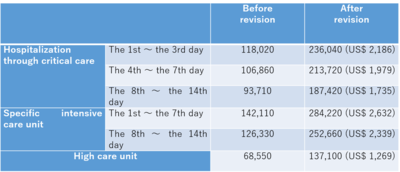Column Finance and the Social Security System 2020.05.21
【Aging, safety net and fiscal crisis in Japan】No.219: The number of births will sharply decrease due to the medical collapse caused by COVID-19
Avigan, a drug developed by FUJIFILM Toyama Chemical Co., Ltd., has become one of the leading candidates for the treatment of patients with COVID-19, and clinical trials are currently underway. However, it is contraindicated in the case of pregnant women due to its teratogenic side effects. Although the seriousness of the risk for pregnant women infected with COVID-19 is unclear, it is still a serious threat. For this reason, many pregnant women in urban areas, where the infection risk is high, wish to give birth at a hospital close to their parents' home, if their parents live in a rural area where there are fewer cases of infection. However, it has been reported that there are multiple cases of local hospitals refusing to accept pregnant women from urban areas due to the perceived risk that they may be infected with COVID-19.
Medical collapse has already occurred in the Tokyo metropolitan area. Additionally, the polymerase chain reaction (PCR) test system to check for infection is delayed. As a result, in hospitals that provide regular medical care, nosocomial infections have occurred without knowing that the patient is infected, and ambulances carrying patients with a fever face the difficulty of being rejected by hospitals. Furthermore, both human resources and medical supplies, such as protective clothing and masks, are lacking in hospitals that accept COVID-19 patients. Therefore, the government has doubled the medical fee for those patients (Table 1).
Table 1 Example of medical treatment fee (amount per day) for COVID-9-infected patients requiring management with ECMO (External Cardiopulmonary Assistance) and mechanical ventilation
 *Please click the table image to find the original size image.
*Please click the table image to find the original size image.
(Source: Ministry of Health, Labor and Welfare)
As mentioned in Column No.3, Japan has the largest number of hospitals per unit population in the world, and Japan's healthcare delivery system is over-invested. Nonetheless, there is a lack of beds due to COVID-19. One of the reasons is that the national/public hospitals and university hospitals, which should be the last resort in the case of a crisis, are disjointed, and even compete with each other. As such, they are unable to quickly establish a collaborative relationship to centralize decision-making in an emergency. If these hospitals were set up by national/local governments to have integrated business operations in normal times, they would have created a strong organization that would be useful in terms of relieving the anxiety of pregnant women who want to go to their parents' home for childbirth. As mentioned in Column No. 211, the number of births in 2019 decreased to 864,000, which is less than the latest future population projection. It is certain that the number of couples refraining from pregnancy will increase due to COVID-19. As a result, births in 2021 and 2022 are expected to continue falling sharply.
